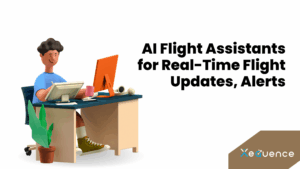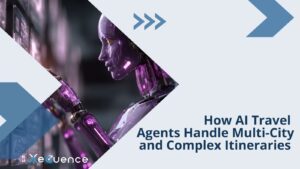- Home
- Artificial Intelligence
- 10 Artificial Intelligence Trends That Hospitality Industry Should Know
10 Artificial Intelligence Trends That Hospitality Industry Should Know
- April 10, 2024
- Suraj Kumar
- Artificial Intelligence, Gen AI, Hotel Management

Top AI trends for hospitality in 2024
The travel and hospitality sector has always been nimble in implementing new ideas and cutting-edge technologies to promote operational excellence and improve visitor experiences. This business is hardly an exception to the growing use of artificial intelligence in many facets of daily life, of course. The International Air Transport Association predicts that passenger traffic would climb significantly in 2024, with an estimated 4.7 billion people expected to travel by air this year, up from 4.5 billion in the year prior to the COVID 19 Pandemic a few years back. The number of visitors predicted to increase by 2024 makes it essential for travel and hospitality brands to have cutting-edge technologies in order to maintain and improve operational excellence while maintaining a focus on the client experience. In this write-up, we are going to examine the leading ML and AI trends and possibilities in this sector for 2024.
Why are hospitality technology trends important?
In today’s digital-driven world, staying updated with the latest hospitality technology is crucial for businesses. Emerging tech streamlines operations, minimizes errors, and boosts efficiency. Integrating solutions like automated scheduling, AI chatbots, and inventory management enhances guest experiences, lowers costs, and ensures smooth operations. To choose the right tech, consider its advantages and disadvantages in relation to your business needs.
Top AI trends for hospitality in 2024
Automation
Human resources, marketing, accounting, and other departments can all employ artificial intelligence to automate labor-intensive tasks. By 2024, AI will replace labor-intensive job with “smart working,” according to pros. Team members will receive time and resource separation despite squandering it on monotonous and repetitive chores, allowing them to concentrate on essential duties that are only human-required.
Generative AI
Artificial intelligence generative is not new. In 2024, AI is expected to be a positive development due to the rapidly increasing usage of technologies like ChatGPT.com. One popular kind of AI technology is generative AI, which can produce a wide range of content, including text, graphics, audio files, and many lines of code written in different languages. Users provide prompts that are used to develop content.
As a result of the increased accessibility and usability of many generative AI applications, it will be a leading trend. In 2024, a lot of organizations will benefit from the continued excitement surrounding artificial intelligence and generative AI tools in the media, as a plethora of new tools aimed at accelerating processes will help them operate more efficiently. Providing educational content in several languages, creating social media reports and captions, and using chatbots for customer service or technical assistance are a few instances.
Robotics
To assist with personalized service, employee assistance, and sustaining customer loyalty, hotels should embrace robots. In addition to offering concierge services and room service that is promptly delivered right to the guest room, they can vacuum. As to a research, the hotel robots market is projected to expand at a compound yearly growth rate of 32.8 percent, from $79 million in 2020 to $338 million by 2025.
AI-Driven Analytics
Another major AI in hotel industry trend that will probably be popular in 2024 is AI-driven analytics. Conventional data analytics involves sifting through raw data to find patterns and gather pertinent insights. Data analysts can process more data more quickly and identify patterns and insights earlier with the help of AI-powered tools and technology, such as machine learning algorithms. Although AI won’t replace data analysts, it will enable them to work more productively.
Chatbots
In 2024, they will likewise be the most popular AI trend. In terms of AI developments in 2024, chatbots will not only proliferate but also grow more sophisticated. They will be exceptional at answering people’s questions, worries, and complaints thanks to machine learning, natural language processing, and other forms of artificial intelligence technologies.
Chatbots will respond with more thorough and pertinent information in the near future. Furthermore, because they will be more adept at mimicking human speech, consumers will be less able to tell the difference between speaking with a chatbot and a real person. AI chatbots will begin to penetrate product categories such as CRM and enterprise resource planning in 2024.
Multimodality
Conventional artificial intelligence models have mostly focused on input processing from one modality. Training models to recognize links between various modalities is now feasible thanks to multimodal deep learning. Text to image or image to video translation is now possible using AI models. That’s why multimodality is going to be one of the biggest AI developments in 2024—an surge in applications. AI technologies such as natural language processing, computer vision, data mining, and speech processing are all necessary for multimodality. AI personalization takes large amounts of data and applies machine learning to process and interpret it in order to generate meaningful outputs.
Diversity, Equity, and Inclusion (DEI)
These days, most businesses require DEI training. Conference panelists and presenters will include more women, and their roles will entail greater responsibility. Diversity is what’s fueling the huge rise in popularity of women in tourism and hospitality. It is hiring more people of color and they are moving up the ranks faster. Examine your surroundings; it’s already taking place!
Sustainability
76% of international travelers express worry about traveling in an environmentally responsible manner. It is expected of hotels to implement eco-friendly materials, eco-conscious operations, and help local communities in addition to reducing waste and energy usage. Today, it is imperative that you feature this on your website.
Remote Workers
Tourism Economics claims that another general advantage of remote employment is flexibility for the travel and hospitality sector. From 5% of workdays prior to the lockdowns to 28% of workdays, or more than one in four, were worked from home. Of leisure travelers, thirty-four percent stated that they intend to travel for work-related reasons. According to Airbnb, frequent weekend stays are being extended by one or two nights during shoulder days.
The Federal Aviation Administration reauthorization bill, shorter wait times for U.S. visitor visa interviews, and quicker customs processing at U.S. airports and ports of entry are three more ways the government intends to enhance the overall experience of flying in addition to the ten trends. Several nations are already carrying this out. In 2024, these tendencies will either be emerging or have already started. I hope 2024 is great for you and there won’t be a recession!
AI-Powered Security Systems
A growing number of companies are incorporating AI into their security procedures, which is the final AI trend 2024. Security systems with AI capabilities are generally advantageous in terms of understanding cyber threats. 2024 is not a surprise, considering the ways in which advancements in AI may reduce overhead costs and increase efficiency and accuracy. Artificial intelligence-driven solutions can also improve the efficiency with which security teams carry out their duties and free up more time for tasks involving human judgment. More than 50% of enterprises would employ AI-driven security operations centers to identify and stop cyber attacks. AI can be used into security measures by businesses in a variety of ways, such as endpoint security and the detection of malware and phishing attempts.
The future of artificial intelligence in hospitality
AI enables personalized experiences through recommendation engines customized to the preferences given by the guests. However, chatbots offer personalized and real-time assistance for enhanced guest interactions. AI in hospitality has the potential to revolutionize both operational efficiency and visitor experiences, promising a path of profound change. As best AI chatbot evolves, its role in hospitality grows, offering limitless potential for innovation. Our company pioneers AI use, positioning us as industry leaders. Those embracing AI and enhancing guest experiences will shape the future of hotels. A hospitality company’s ability to stay competitive as well as promote innovation and expansion can be achieved by embracing these trends. A more connected and immersive hospitality experience can be achieved by the industry by strategically utilizing AI technologies to anticipate and surpass guest expectations.
Recent Posts
5 Myths About AI in Hospitality Operations | Facts Every Hotelier Should Know
Newsletter
Get regular updates on data science, artificial intelligence, machine
You may also like

Al Flight Assistant Integration with Airline Reservation Systems

The Future of Hospitality Operations: AI Trends to Watch

AI Flight Assistants for Real-Time Flight Updates, Alerts




